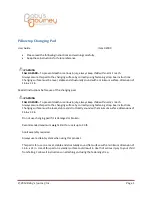
35
distance of one thousand yards. The apparent field of each eyepiece that Celestron manufactures is found in the
Celestron Accessory Catalog (#93685).
G
G
e
e
n
n
e
e
r
r
a
a
l
l
O
O
b
b
s
s
e
e
r
r
v
v
i
i
n
n
g
g
H
H
i
i
n
n
t
t
s
s
When working with any optical instrument, there are a few things to remember to ensure you get the best possible
image.
•
Never look through window glass. Glass found in household windows is optically imperfect, and as a result, may
vary in thickness from one part of a window to the next. This inconsistency can and will affect the ability to focus
your telescope. In most cases you will not be able to achieve a truly sharp image, while in some cases, you may
actually see a double image.
•
Never look across or over objects that are producing heat waves. This includes asphalt parking lots on hot
summer days or building rooftops.
•
Hazy skies, fog, and mist can also make it difficult to focus when viewing terrestrially. The amount of detail seen
under these conditions is greatly reduced. Also, when photographing under these conditions, the processed film
may come out a little grainier than normal with lower contrast and underexposed.
•
If you wear corrective lenses (specifically glasses), you may want to remove them when observing with an
eyepiece attached to the telescope. When using a camera, however, you should always wear corrective lenses
to ensure the sharpest possible focus. If you have astigmatism, corrective lenses must be worn at all times.
















































